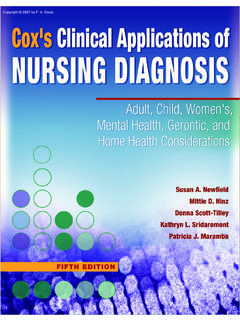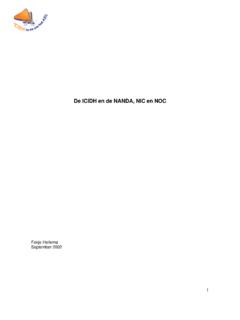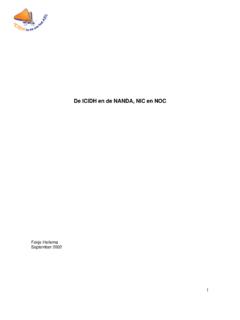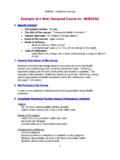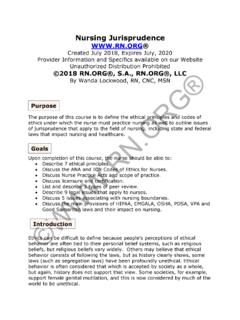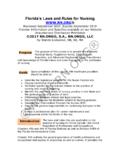Transcription of Objectives - Verpleegkunde.net
1 health promotion TheoriesBonnie RaingruberObjectives At the conclusion of this chapter, the student will be able to: Compare and contrast nursing and non- nursing health promotion theories. Examine health promotion theories for consistency with accepted health pro-motion priorities and values. Articulate how health promotion theories move the profession forward. Discuss strengths and limitations associated with each health promotion theory or model. Describe the difference between a model and a theory. Identify theoretical assumptions and concepts within nursing and non- nursing theories. Develop his or her own health promotion shOuld health promotion be theOry-based?A variety of authors have commented that health promotion programs typically lack a theoretical foundation or are based on a conceptual model that does not conform to the current values and norms of health promotion practice (Bauer et al.)
2 , 2003; King, 1994; Stokols, 1996; Whitehead, 2004). Commonly, environmental, social, cultural, economic, and political influences are given scant or no attention within health promo-tion theories. These factors may well be some of the main reasons a health promotion program that has its design based on a particular theory is not as effective as the author hoped it would (2001a) commented that the reliance on health education theories and frameworks may actually pose a barrier to progress in the arena of health promotion . 53C h a p t e r 3 Jones & Bartlett Learning, LLC. NOT FOR SALE OR DISTRIBUTIONHe emphasized that if the confusion persists between health education and health pro-motion theories and models, it will be increasingly difficult for nurses to identify when they are implementing health promotion activities and programs.
3 Whitehead (2006) suggested that without a clear theoretical basis, it would not be possible to move forward or ensure that the health promotion components of nursing practice are we have seen, there has been a shift from individually focused health education to community and environmentally-based health promotion . There has also been a shift from illness-focused priorities, such as disease prevention and health protection, to a focus on complete physical, emotional, and social well-being. We will see if these new priorities show up in the theories and models that are currently providing guidance to practice, research, and education in the health promotion the complexity of health promotion practice, multilevel, comprehensive interventions are needed to develop effective programs. It is vital to consider psycho-logical, organizational, cultural, community-level, political, and policy-driven factors that influence health .
4 Targeting one single pattern of unhealthy behavior such as smok-ing will not be effective if the person also drinks to excess, consumes large amounts of saturated fat, has an irregular sleep pattern, performs a stressful job, and works in an area that has poor air quality. Interventions that target unhealthy lifestyles by simulta-neously focusing on multiple factors are more likely to be effective. Theories are needed to provide support for multilevel interventions that produce reliable outcomes. As we will see, not all existing health promotion theories support multilevel provide a roadmap and a step-by-step summary of what factors to con-sider when designing, implementing, and evaluating a health promotion program. It is vital to have a theoretical understanding of why people behave the way they do if nurses are to help a person, a family, a group, or a community improve their health status.
5 Theories provide relevant clues as to why people and communities make health -related choices and offer a systematic way of understanding situations, examining relation-ships, and predicting outcomes. Theories help explain why an intervention is necessary, how to intervene, and how to evaluate success (Glanz & Rimer, 2005). Glanz and Rimer (2005) suggested that theory helps practitioners to inter-pret the findings of their research and make the leap from facts on a page to understanding the dynamic interactions between behavior and environmental context (p. 43).The succinct summary or graphic presentation pro-vided by a theory makes complex interrelationships among multiple variables easier to understand (Healey & Zimmerman, 2010). As Green and colleagues (2010) com-mented, the role of theory is to untangle and simplify for Thomas Mounsey/ShutterStock, C h a p t e r 3 health promotion Theories Jones & Bartlett Learning, LLC.
6 NOT FOR SALE OR DISTRIBUTION human comprehension the complexities of nature. Once the critical components of a complex problem are illuminated by theory, practical applications become possible (p. 398). The job of a good theory is to present content in enough detail so that it describes the behavior of a large (generalizable) group of people, but also to be simple to understand, implement, and evaluate (Green et al., 2010). Theory provides a broad road-map that helps explain the dynamics of health behavior, identify effective interventions, select suitable target audiences, and evalu-ate outcomes (Glanz & Rimer, 2005).Cole (1995) stressed that all healthcare practitioners need to be introduced to theo-retical concepts in their formal education because whether they are aware of it or not, they use theories and models to guide their practice and research efforts.
7 Antonovsky (1996) suggested that without adequate theoretical guidance from a theory or model that is consistent with principles of health promotion , the field is at risk of stagnation. He emphasized that theory is needed to guide the field, provide direction to practice, and structure program evaluation, believing that good theories give birth to good ideas capable of being incorporated into Best and colleagues (2003) commented, the field of health promotion has become too complex for any one theory to provide adequate guidance to education, practice, and research. Green et al. (2010) stressed that there are different ways of knowing, different lenses for viewing reality, and different realities to be known (p. 401). Different perspectives are needed for different health promotion issues and settings.
8 Glanz and Rimer (2005) agreed that multiple theories are needed to address the varied challenges that arise in health promotion . They emphasized that effective practice depends on using theories and strategies that are most appropriate to a given situ-ation (Glanz & Rimer, 2005, p. 6). The key is being able to analyze how well a theory or model fits the given situation, because different theories are needed for individual-level intervention, organizational-level intervention, and community-level intervention. In order to select the most relevant theory for a given situation, it is necessary to become familiar with the numerous multidisciplinary theories that have been used in health promotion we explore theories of health promotion , we will look at models that contain abstract, general concepts and do not yet have extensive research-based support as well as theories that have more clearly defined concepts and have been tested in a substantial Why Should health promotion Be Theory-Based?
9 55 Jones & Bartlett Learning, LLC. NOT FOR SALE OR DISTRIBUTION number of studies. We will explore the assumptions or beliefs that were taken for granted by the theorist in creating the theory. We will pay attention to the concepts (set of ele-ments or categories) that comprise and distinguish the theory. It may be helpful at times to examine the relationships (called propositions) between concepts within the this chapter, we will examine behavioral theories, an intervention-based model, environmental theories, communication theories, and evaluation theories that come from a spectrum of disciplines. We will also review select nursing theories that have relevance to health promotion . It is important to examine the breadth of theoretical health promotion knowledge in order to identify the most practical theories that are able to provide guidance to practice, education, and change theOriesA number of behavioral change theories exist to explain why people do and do not adopt certain health behaviors.
10 Often, these theories examine the predictors and pre-cursors of health behavior. Many of these theories have common elements such as self-efficacy and motivation. Self-efficacy is one s belief in their ability to do something, such as change a health related behavior, and it is grounded in one s past success or failure in the given activity. One s self-efficacy is seen as predicting the amount of effort one will expend in trying to change (Bandura, 1977).Criticism of many of the behavioral change theories focuses on their emphasis on individual behavior while excluding the influence of environment, sociocultural fac-tors, economic issues, and policy level mandates. Constraints such as chronic expo-sure to violence, political upheaval, and poor sanitation are ignored in favor of paying greater attention to individual cognitive processes (Stokols, 1996).
